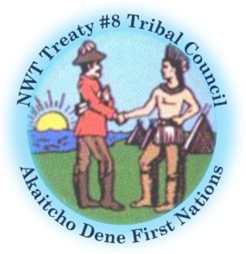PUBLIC NOTICE: COVID-19
Akaitcho Territory Government & Akaitcho Community Skills Development ProgramCOVID-19 Procedures:
Akaitcho Territory Government (ATG) Executives are taking precautionary measures to protect the health & safety of the public & staff. Therefore, offices will remain closed to the public until further notice.
To effectively assist clients during this difficult time, the Akaitcho Community Skills Development Program (ACSDP) has made temporary changes to our program delivery. For more information contact the Local or Regional Office staff via EMAIL or TELEPHONE.
Keep informed & updated on COVID 19 by visiting the GNWT Health & Social Services Website
Akaitcho Community Skills Development Program (ACSDP)
Through the Indigenous Skills Employment Training (ISET) Agreement with Service Canada, the Akaitcho Community Skills Development Program (ACSDP) was designed to assist the Indigenous population to share in Canada’s economic opportunities by the attainment, advancement, and retention of meaningful and sustainable employment.
Akaitcho Community Residents of:
Yellowknife, NT
Dettah, NT
Ndilo, NT
Lutsel K’e, NT
Fort Resolution, NT
Hay River, NT
Enterprise, NT
Fort Smith, NT
How We Serve
Contact your closest ACSDP office to request an application & for details on eligibility & program requirements.
Community Supports & Services
- Individual Sponsorships
- Youth Advancement Program
- Project Contributions
- Employment Supports
- NWT Registered Childcare Assistance
- Community Event Partnership Funds (Workshop, Fairs, Etc.)
- Wide Range of Minimal Employment Supports
Standard Criteria
- First Nation & Inuit:
- Inuit residents must apply here first: Education and Training | Inuvialuit Regional Corporation (IRC)
- Ages 15+to receive Financial Sponsorships or Contributions
- Akaitcho Community Resident
- Temporary Covid Policy:
- Members living in other geographical areas
- First Nations Registered as YKDFN, LKDFN, SRFN, & DKFN Members
- Individual Sponsorship Funds available to those who secured Primary Funds
Training Opportunities
- Traditional Knowledge
- Youth Training
- Persons with Disability
- Business Development
- Natural & Environmental Resources
- Tourism & Hospitality
- Employment Supports
- Wage Subsidy/ Work Experience
- Postsecondary Supports
- Short-term Courses
- Literacy Levels 130 & higher
- Driver Training
- Safety Training
Certified Programs List: Out of Territory
- Private institutions not funded
Childcare/ Daycare Service Programs
- First Nation or Inuit Children
- NWT Registered Daycare or Day Home
- Training Applicants must include Education, Culture & Employment (ECE) Wage Subsidy Assessment Notice
- Newly Employed or Employed but Financially Struggling Applicants must include an Employer Letter Confirming Employment Details.
Community Supports & Services
- Individual Sponsorships
- Youth Advancement Program
- Project Contributions
- Employment Supports
- NWT Registered Childcare Assistance
- Community Event Partnership Funds (Workshop, Fairs, Etc.)
- Wide Range of Minimal Employment Supports
Standard Criteria
- First Nation & Inuit
- Inuit residents must apply here first: Education and Training | Inuvialuit Regional Corporation (IRC)
- Ages 15+to receive Financial Sponsorships or Contributions
- Akaitcho Community Resident
- Temporary Covid Policy:
- Members living in other geographical areas
- First Nations Registered as YKDFN, LKDFN, SRFN, & DKFN Members
- Individual Sponsorship Funds available to those who secured Primary Funds
Certified Programs List: Out of Territory
- Private institutions not funded
Training Opportunities
- Traditional Knowledge
- Youth Training
- Persons with Disability
- Business Development
- Natural & Environmental Resources
- Tourism & Hospitality
- Employment Supports
- Wage Subsidy/ Work Experience
- Postsecondary Supports
- Short-term Courses
- Literacy Levels 130 & higher
- Driver Training
- Safety Training
Childcare/ Daycare Service Programs
- First Nation or Inuit Children
- NWT Registered Daycare or Day Home
- Training Applicants must include Education, Culture & Employment (ECE) Wage Subsidy Assessment Notice
- Newly Employed or Employed but Financially Struggling Applicants must include an Employer Letter Confirming Employment Details.
Application Deadlines:
Post-Secondary & Literacy
- Fall Term (Sept. – Dec.): July 15
- Winter Term (Jan. – Apr.): November 15
- Spring/ Summer (May – Aug.): March 15
- Short Term Programs (20 days prior to start date)
- Late applications may be assessed prior to program starting
Ineligible Applicants
- Highschool students who quit school to attend training
- Previously sponsored applicants who withdrew, were dismissed, or terminated their training
- Programs that have STARTED
- Applicants who consider quitting their job to attend training must contact regional office
- Applicants applying to repeat courses
- Ineligible Education Facilities:
– Native Women’s Association of NWT
– Tree of Peace
– Divergent Driving School
How to Apply
- To apply for ACSDP sponsorship funds, contact your local office or ACSDP Regional Office:
– They will provide a current application form. - This application process is long & can feel stressful.
– We strongly encourage you to request our assistance to complete this process. - Upon receiving an application, the file will remain open for 30 days, enabling you to access assistance from staff & add documents to complete the entire application
- Applications are processed in order received.
– Reviewed in the order they are completed.
Individual Application Checklist
- Must complete & sign all sections of the application
- Must include Letter(s) from other Funding Agencies
- Letter of Acceptance
- Updated Resume
- Most Recent Transcripts
- Student Course Schedule
- Clear copies of:
- Drivers License
- First Nation/Inuit Status Card or an Official Letter Confirming Status
- Health Care Card, including copies for Claimed Dependants
- Depending on the type of sponsorship you request, additional documents maybe be required.
The application process is long, but we are here every step of the way!
Upcoming Training
Title of Training Course
Start Date – End Date
Title of Training Course
Start Date – End Date
Akaitcho Territory Government Scholarships
Akaitcho Treaty 8 Scholarship/ Bursary
Akaitcho Treaty 8 Scholarship/ Bursary: recognizing and commending Members who are affiliated with one of the five Dene Member First Nations in their educational endeavours & achievements for the betterment of their future
Marilyn Sanderson Memorial Scholarship (MSMS)
Marilyn was a very special, dedicated & committed employee. She worked for ATG and Member First Nations for fifteen years. Her personal commitment to excellence and professionalism resulted in the growth and progression of ATG in all aspects of its mandate. With this scholarship, ATG proudly honours Marilyn every year.
Creating opportunities for the First Nation & Inuit population with supports needed to prepare for, find & keep high demand jobs now & in the long term.
Success Stories:
a few of many
Alma Mandeville, recipient & successful employee at the Akaitcho Territory Government as their Akaitcho Community Skills Development Administrative Assistant
Start writing Your success story today!
Historical Background
The Indigenous Skills & Employment Training (ISET) Program is designed to help Indigenous people improve their skills & find employment.
Employment and Social Development Canada engaged with key Indigenous partners & organizations across the country to review & renew the Aboriginal Skills and Employment Training Strategy (ASETS). The ISET Program is a result of these engagements & came into effect on April 1, 2019.
The ISET Program builds on what was successful about ASETS & reflects what was heard from Indigenous partners, resulting in a co-developed program with Indigenous partners that includes:
- increased funding
- greater flexibility for organizations to design programming to meet the needs of their people & communities
- a new distinctions-based strategy that recognizes, respects & reflects Canada’s Indigenous peoples, specifically the First Nations, Métis & Inuit, but also addresses urban/non-affiliated service delivery needs
Historical Background
The Indigenous Skills & Employment Training (ISET) Program is designed to help Indigenous people improve their skills & find employment.
Employment and Social Development Canada engaged with key Indigenous partners & organizations across the country to review & renew the Aboriginal Skills and Employment Training Strategy (ASETS). The ISET Program is a result of these engagements & came into effect on April 1, 2019.
The ISET Program builds on what was successful about ASETS & reflects what was heard from Indigenous partners, resulting in a co-developed program with Indigenous partners that includes:
- increased funding
- greater flexibility for organizations to design programming to meet the needs of their people & communities
- a new distinctions-based strategy that recognizes, respects & reflects Canada’s Indigenous peoples, specifically the First Nations, Métis & Inuit, but also addresses urban/non-affiliated service delivery needs

Frequently Asked Questions
The following list of questions was created by our experienced staff.
It is a direct reflection of the questions we receive most often from you, the people we serve.
What is the Mission of Akaitcho Community Skills Development (ACSD) Program?
The Akaitcho Community Skills Development Program (ACSDP) Mission is dedicated to the principles of preparing clients within the Akaitcho Region for their future opportunities & career goals.
This program will allow our region to address the employment barriers & improve the labour market for our people within the Akaitcho Region.
The objective is to deliver comprehensive, inclusive programming that successfully addresses gaps between individual skills & workforce participation.
ATG will offer training opportunities for First Nation & Inuit people who are unemployed or underemployed to provide employers with skilled workers. ATG facilitates the alignment of industry training & employment, enabling learning facilities to anticipate employment trends.
Who is the Akaitcho Community Skills Development (ACSD) Program looking for?
Unemployed or under employed clients seeking assistance as they work toward their long-term employment goals.
Is the ACSDP an education fund?
The ACSD program is NOT an education fund.
This sponsorship program helps create opportunities for First Nations & Inuit clients, providing supports needed to prepare for, find, & keep high demand employment now & in the future.
As a First Nation/ Inuit member, how do I access ACSDP sponsorship funds?
The ACSD Program, ISET Agreement is available throughout Canada, but each region differs. The Akaitcho ACSD Program is residency based so depending on where you currently reside, determines the type of service that is offered.
I am employed. Can I access ACSDP sponsorship?
Applicants who are currently employed & seeking training assistance do not meet the requirements because ACSDP considers this, employee capacity building.
If a client requires additional training to become promoted into a new position or changes positions within the company, then confirmation by way of an employer letter is required.
Do you have to be a First Nation/ Inuit registered member within the 5 Akaitcho communities to qualify?
No, the ACSDP is community based so it would depend on your current residency.
Can I Request a Refusal Notification Letter?
ACSDP does not provide Refusal Notification Letters on request. All individuals are required to go through the application process.
Why does the ACSDP require so much information?
The Akaitcho Territory Government’s ISET Agreement with Service Canada is to assist in monitoring, assessing, & evaluating the effectiveness of assistance provided within this program.
Are these funds Impact Benefits Agreement (IBA) First Nation Education Funds?
No, the ACSDP is managed by Akaitcho Territory Government (ATG) Executives for First Nation/ Inuit residents who reside within the Akaitcho Region.
What is an Employment Insurance (EI) intervention referral?
Intervention Referrals are submitted on the applicant’s behalf to notify the Service Canada Employment Insurance (EI) Department that the applicant will continue to receive EI benefits as they attend training or other employment activities approved through an ACSDP application request.
Applicants must contact the Service Canada Employment Insurance Department directly in regards to the status of their Intervention Referral. ACSDP does not have access to this information.
What is "council to quit"? How does this work?
An assessment must be done prior to leaving employment. A ‘council to quit’ employment position prior to attending an approved employment benefit activity to support in making informed training choices while allowing for EI benefits eligibility.
When I am on referred training, how do I complete my biweekly Employment Insurance reports?
Biweekly reports can be completed on the Canada.ca website, found at Internet Reporting – Service Canada
Training
If you attended school or training, report the number of hours that you were in training & the amount of any training allowance received. Do not include allowances for living away from home, commuting, travel, or dependent care.
If you have any further questions, please contact Employment Insurance at 1-800-206-7218.
Employment Insurance Department Notice: Training has not been filed. Contact the sponsored organization to put the information on file.
If an applicant is receiving/ planning to receive Employment Insurance (EI) & has been approved for ACSDP sponsorship funds.
– ACSDP will forward Service Canada & EI the Intervention Referral on the client’s half as they continue to receive their bi-weekly EI benefits.
– Also remember: if an applicant is sponsored by ACSDP through an EI Referral this means that an applicant must adhere to ACSDP terms & conditions. ACSDP can choose to withdrawal sponsorship on an EI intervention referral at any time.
Other Funding
ACSDP applicants must seek other available funds to qualify
Other Funders
ACSDP applicants must seek other available funds to qualify

EMPLOYMENT OPPORTUNITY
Position Title: Employment Training Officer
Employment Type: Full Time
Location: Hay River, NT
Hours: 9:00am – 5:00pm
Closing Date: May 21, 2021
Akaitcho Community Skills Development Regional Office (ISET) invites all candidates, to apply for the local Employment Training Officer position, to assist in the delivery of Akaitcho Community Skills Development Program (ISET Agreement). The Employment Training Officer is a key member of Akaitcho Community Skill Development Program team.
Key Duties and Responsibilities:
• Client Services and Supports
• Understand standard office administrative procedures
• Exceptional knowledge with Microsoft Office
• Maintain a high level of accuracy in correspondence
• Excellent organizational and multitasking skills
• Reliable and able to meet strict deadlines and professionalism
• Complete tasks in a stressful environment with limited supervisions
• Assistance and manage confidential material
• Positive attitude and work ethic
• May require travel
Education and Experience
The ideal candidate for this position will have a certificate in Office Administration coupled with two (2) year relevant work experience; or Grade 12 or equivalent with four years related work experience in administration duties or in a related field will be considered.
The incumbent requires:
Job Description: Available upon request.
Resume must Include:
1. Cover Letter
2. References: Limited to three
3. Criminal Record Check is a prerequisite – must be included. Failure to provide a satisfactory check may deem you disqualified from the position.
Inquiries only:
Program Regional Coordinator
Akaitcho Territory Government
General Delivery
Fort Resolution, NT X0E 0M0
Email: training.assistant@akaitcho.ca
We thank all interested applicants in applying. Only those applicants who qualify based on the above, will be selected for an interview.
CONTACT
Akaitcho Community Skills Development Program (ACSDP)
Gloria Basillie
Employment Training Officer
Fort Resolution Local Office
Office Complex
Hours: 9:00 am – 5:00 pm
Ph: 867-394-3070
Fax: 867-394-3112
Dawn Catholique
Employment Training Officer
Lutsel K’e Band Office
Hours: 9:00 am – 5:00 pm
Ph: 867-370-7005
Fax: 867-370-3010
Gotia Hardisty
Employment Training Officer
Yellowknife Local Office
Chief Drygeese Conference Centre
Hours: 9:00 am – 5:00 pm
Ph: 867-873-4307 Ext#2008
Fax: 867-394-3112
Vacant – Hay River Office
Contact Regional Office
Unoccupied Communities
Contact Regional Office
Toll Free: 844-780-0163
Vacant – Fort Smith Office
Contact Regional Office
Akaitcho Community Skills Development Program (ACSDP)
Regional Office – Fort Resolution Office Complex
Hours: 9:00 am – 5:00 pm
Toll Free: 1 – 844 – 785 – 0163
Ph: 867 – 394 – 3154
Fax: 867 – 394 – 3112
Akaitcho Community Skills Development Program (ACSDP)
Regional Office – Fort Resolution Office Complex
Hours: 9:00 am – 5:00 pm
Toll Free: 1 – 844 – 785 – 0163
Ph: 867 – 394 – 3154
Fax: 867 – 394 – 3112
Gotia Hardisty
Employment Training Officer
Yellowknife Local Office
Chief Drygeese Conference Centre
Hours: 9:00 am – 5:00 pm
Ph: 867-873-4307 Ext#2008
Fax: 867-394-3112
Gloria Basillie
Employment Training Officer
Fort Resolution Local Office
Office Complex
Hours: 9:00 am – 5:00 pm
Ph: 867-394-3070
Fax: 867-394-3112
Dawn Catholique
Employment Training Officer
Lutsel K’e Band Office
Hours: 9:00 am – 5:00 pm
Ph: 867-370-7005
Fax: 867-370-3010
Vacant – Hay River Office
Contact Regional Office
Vacant – Fort Smith Office
Contact Regional Office
Unoccupied Communities
Contact Regional Office
Toll Free: 844-780-0163






